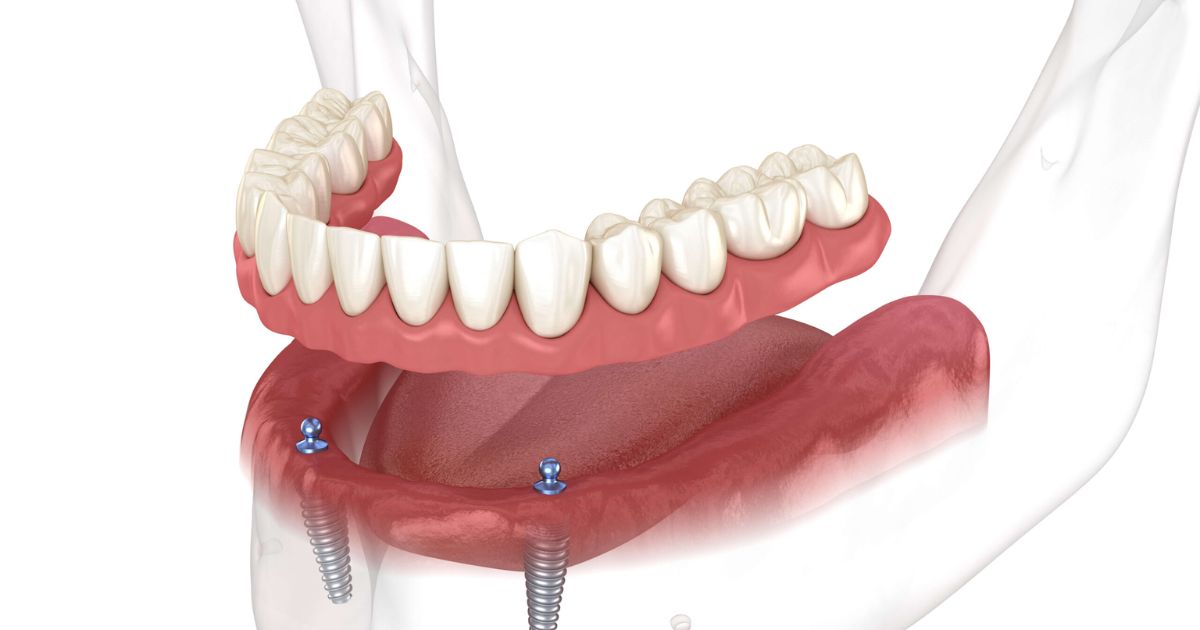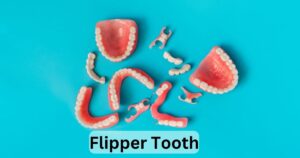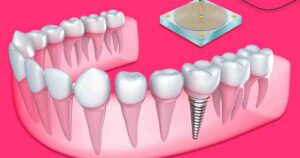Implant dentures represent a revolutionary solution in restorative dentistry, offering enhanced stability, functionality, and aesthetics compared to traditional dentures. Unlike conventional removable dentures, implant-supported dentures are firmly anchored to the jawbone through surgically placed implants, providing a more secure fit and eliminating issues like slippage or discomfort.
This innovative approach involves integrating dental implants into the jaw, creating a stable foundation for custom-made dentures. Whether for replacing a single tooth or an entire arch, implant dentures offer remarkable stability and restore natural biting and chewing functions, significantly improving quality of life for individuals with missing teeth.
The process typically involves a thorough assessment, precise implant placement, and the crafting of tailored prosthetics. Implant dentures not only offer an aesthetically pleasing smile but also promote better oral health by preventing bone loss and maintaining facial structure.
Benefits of Implant Dentures Over Traditional Dentures
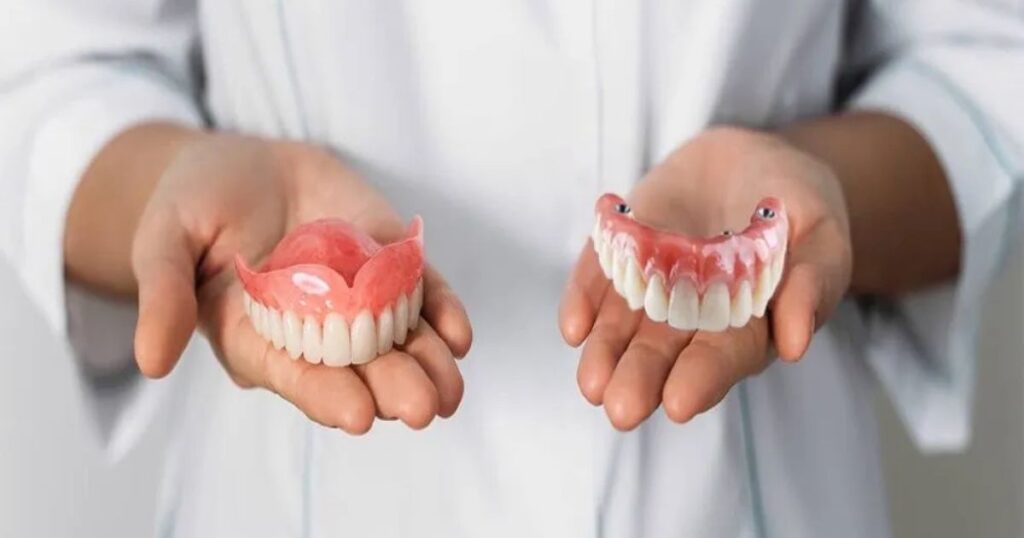
Implant dentures offer a range of advantages compared to traditional dentures:
Enhanced Stability: Unlike removable dentures, implant-supported ones are anchored securely to the jawbone, preventing movement or slipping while speaking or eating.
Improved Functionality: With a stronger foundation, implant dentures restore nearly natural biting and chewing abilities, allowing for greater comfort and confidence in eating various foods.
Preservation of Bone Health: Dental implants stimulate the jawbone, preventing deterioration and preserving facial structure, which can occur with traditional dentures due to lack of stimulation.
Long-Term Solution: Implant dentures are durable and can last a lifetime with proper care, eliminating the need for frequent replacements or adjustments common with traditional dentures.
Enhanced Comfort: The secure fit of implant-supported dentures reduces gum irritation and discomfort often associated with removable dentures.
Improved Speech: Stability provided by implant dentures can enhance speech and pronunciation, minimizing issues such as slurred speech often experienced with traditional dentures.
Aesthetics: Implant dentures look and feel more natural, providing a more aesthetically pleasing smile and facial appearance.
These benefits collectively make implant dentures a preferred choice for many individuals seeking a reliable and long-lasting tooth replacement option.
Benefits of Implant Dentures Over Traditional Dentures
Implant dentures offer a range of advantages compared to traditional dentures:
Enhanced
Enhanced stability in dental implants refers to the secure anchoring of prosthetics to the jawbone, providing a steadfast foundation for artificial teeth. This stability prevents movement or slipping of dentures while speaking, eating, or performing daily activities.
By integrating implants into the bone structure, implant-supported dentures offer a reliable solution, ensuring greater confidence, comfort, and natural functionality compared to traditional removable dentures.
Improved functionality
Improved functionality in implant dentures signifies the restoration of natural biting and chewing abilities. With a secure foundation anchored to the jawbone, these dentures offer enhanced stability, enabling individuals to comfortably eat a wide variety of foods.
Unlike traditional dentures, implant-supported prosthetics mimic the feel and function of natural teeth, providing greater confidence and ease in daily activities like eating, speaking, and smiling.
Preservation of bone health
Preservation of bone health is a key benefit of implant dentures. Dental implants stimulate the jawbone, preventing deterioration that commonly occurs with missing teeth. By integrating into the bone structure, implants mimic natural tooth roots, halting bone loss and maintaining facial structure. This preservation not only supports the stability of the dentures but also promotes long-term oral health, ensuring the jawbone remains strong and healthy over time.
Implant dentures
Implant dentures offer a long-term solution for tooth replacement. With proper care, these durable prosthetics can last a lifetime, eliminating the frequent adjustments or replacements often required with traditional dentures.
The integration of dental implants into the jawbone provides a stable foundation, ensuring longevity and reliability. This long-term solution grants individuals restored confidence, functionality, and aesthetics without the concern of continual replacements, making it a sustainable choice for comprehensive dental restoration.
Enhanced
Enhanced comfort with implant dentures arises from their secure fit and stability. Unlike traditional dentures that may cause gum irritation or discomfort due to movement, implant-supported dentures remain firmly anchored to the jawbone.
This eliminates rubbing or shifting, offering a more comfortable experience. The snug fit and stability not only enhance comfort but also provide individuals with the confidence to eat, speak, and smile without concerns about denture movement or discomfort.
Improved speech
Implant dentures contribute to improved speech by offering a stable foundation that aids in clearer pronunciation. Unlike traditional dentures that might cause slurred speech due to movement, implant-supported dentures remain secure, enhancing articulation.
The stability of these prosthetics ensures that individuals can speak confidently without worrying about denture displacement, allowing for clearer and more natural speech patterns, thus boosting overall communication and confidence in social interactions.
Aesthetics
Aesthetics in implant dentures present a natural-looking and pleasing smile. These prosthetics closely resemble real teeth, enhancing facial appearance and self-confidence. Implant-supported dentures are meticulously crafted to match the shape, color, and alignment of natural teeth, creating a seamless and attractive smile.
Their stability and lifelike appearance not only restore confidence but also provide individuals with a beautiful and natural-looking set of teeth, significantly improving overall facial aesthetics.
How Do Implant Dentures Work?
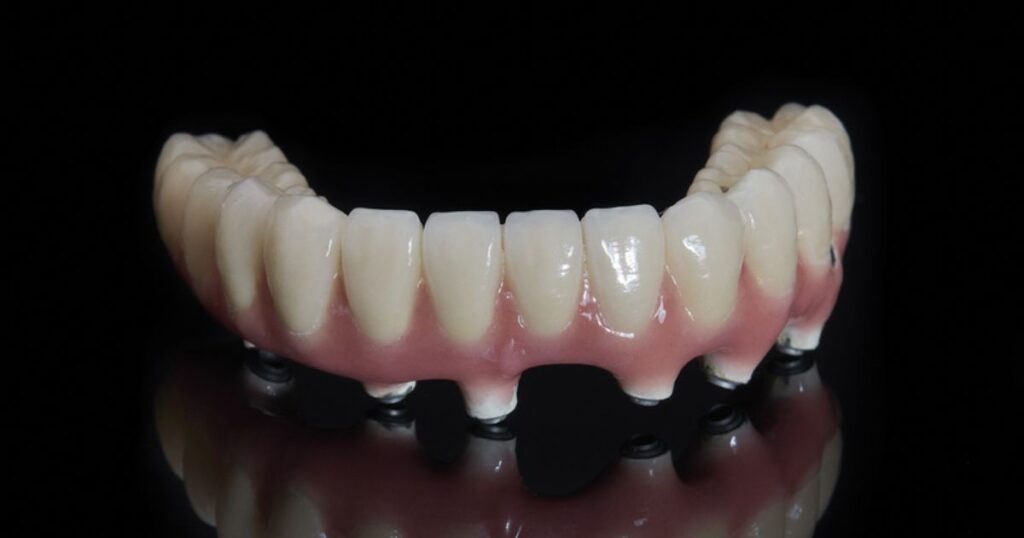
Implant dentures function by merging the stability of dental implants with the functionality of dentures. Typically, small titanium posts are surgically embedded into the jawbone, acting as artificial tooth roots. These implants serve as stable anchors for the dentures, allowing them to securely snap or attach onto the implants.
This integration creates a strong foundation for the prosthetics, preventing movement while eating, speaking, or laughing. Custom-designed dentures are then attached to these implants, providing a natural look and restoring functionality.
This innovative approach ensures a secure fit, mimicking the feeling and function of natural teeth, ultimately offering individuals a reliable and comfortable solution for tooth replacement.
The Process of Getting Implant Dentures Explained
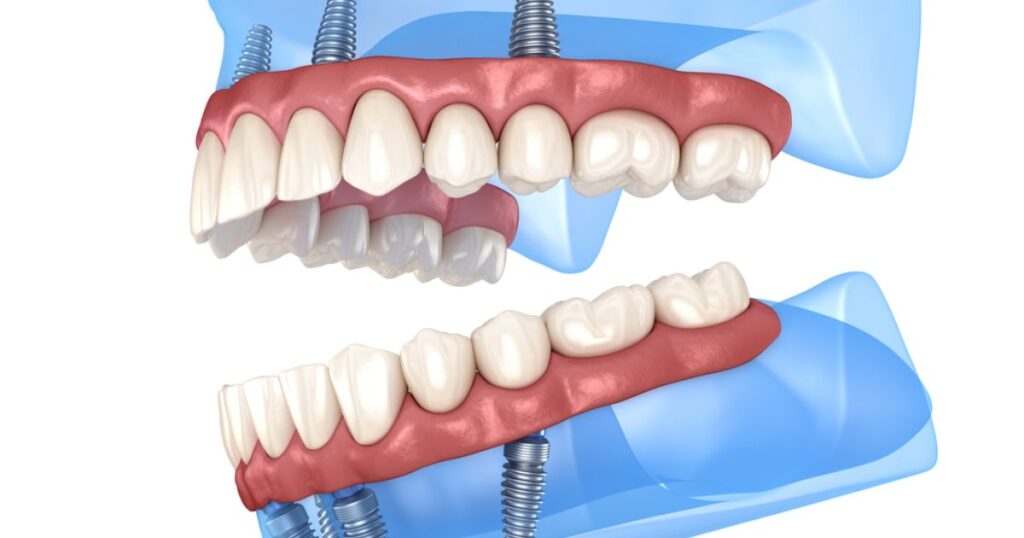
The process of acquiring implant dentures involves several stages. Initially, a comprehensive assessment of oral health and bone structure is conducted to determine candidacy.
Surgical placement of titanium implants into the jawbone follows, allowing for osseointegration, where the bone naturally bonds with the implants over time. This healing phase might take a few months, during which temporary dentures may be worn. Once the implants are integrated, custom dentures are meticulously crafted to fit precisely onto the implants, providing stability and natural aesthetics.
Regular check-ups ensure proper healing and functionality, resulting in restored confidence and improved oral function for individuals seeking a lasting tooth replacement solution.
Types of Implant-Supported Dentures
There are several types of implant-supported dentures tailored to individual needs:
Bar-Retained Dentures
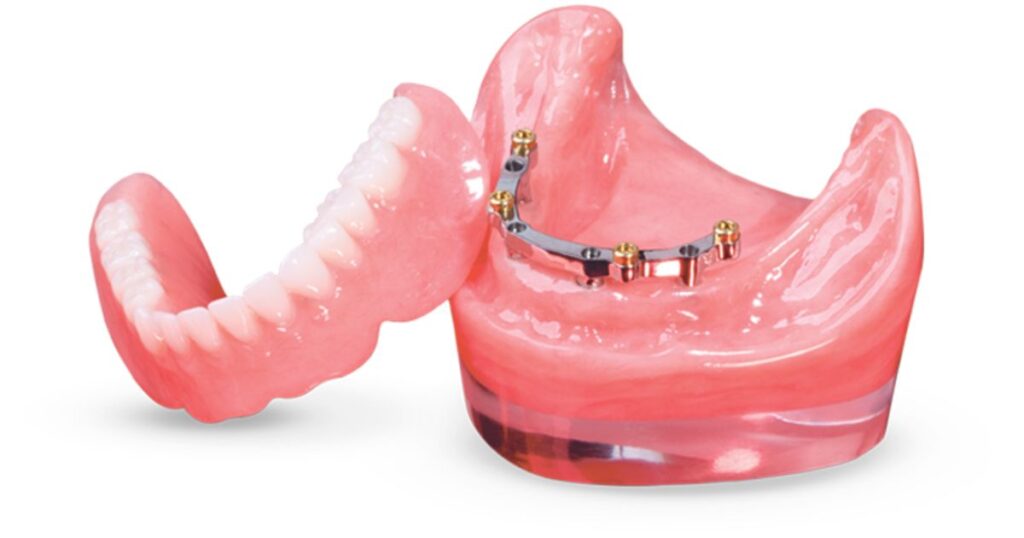
Bar-retained dentures utilize a thin metal bar attached to dental implants to support the denture. The bar follows the curve of the jawbone and is securely fastened to the implants.
The denture, equipped with clips or attachments, fits onto the bar, ensuring stability and support. This design allows for easy removal for cleaning while providing a reliable and secure fit, offering individuals with missing teeth enhanced comfort and functionality in their daily activities.
Ball-Retained Dentures (Locator Attachment)
Ball-retained dentures, also known as locator attachment dentures, utilize implants with ball-shaped attachments that fit into sockets on the denture. These attachments create a secure connection, allowing the denture to snap onto the implants. It provides stability and support. This design permits easier cleaning and maintenance of the denture while ensuring a snug fit. Ball-retained dentures offer improved confidence in speaking and eating, mimicking the feel and function of natural teeth.
All-on-4 or All-on-6 Dentures
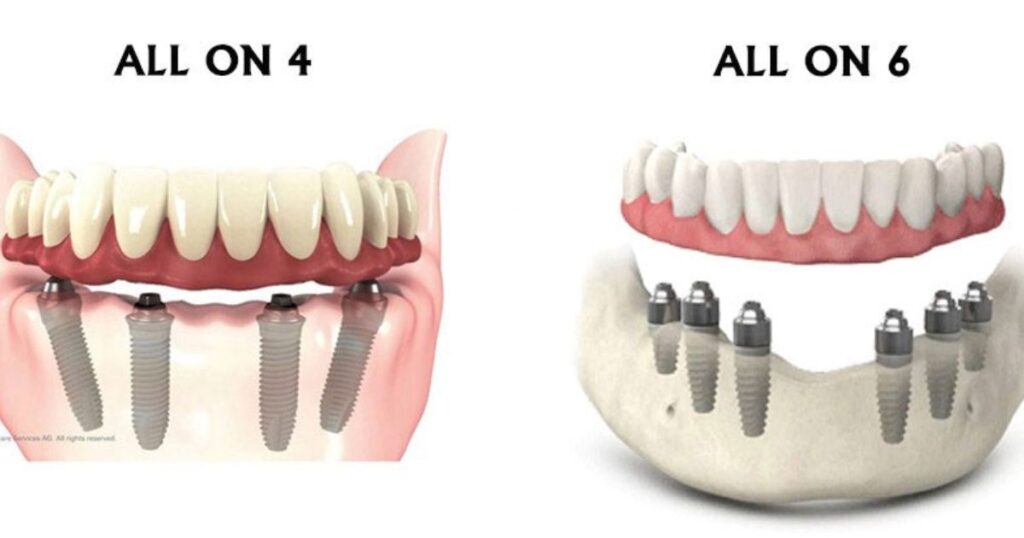
All-on-4 or All-on-6 dentures are innovative solutions for complete tooth restoration. With fewer implants (four or six) strategically positioned in the jawbone, these dentures provide comprehensive support for an entire dental arch.
This minimally invasive technique offers a stable, fixed prosthesis, often eliminating the need for bone grafting. All-on-4 or All-on-6 dentures restore functionality and aesthetics efficiently, offering a durable, non-removable solution for those seeking a full-mouth restoration.
Hybrid Dentures
Combining the stability of implants with the coverage of a full arch, these dentures are fixed prosthetics with the look and function of natural teeth.
Each type varies in design, attachment method, and suitability based on individual jaw structure, preferences, and specific dental needs, offering diverse options for implant-supported denture solutions.
Implant Dentures: Cost and Financial Considerations
Apologies for the confusion earlier. Here’s a simple text-based representation of a chart outlining cost and financial considerations for implant dentures:
———— —————
| Aspect Estimated Cost |
——————————————– ———————————–
| Initial Consultation Free or nominal fee
| Implant Surgery (per implant) $1,000 – $3,000
| Abutment and Crown (per tooth) $500 – $3,000
| Diagnostic Procedures $100 – $500
| Anesthesia and Medications Variable
| Follow-up Appointments Variable
| Insurance Coverage Varies widely
| Financing Options Payment plans, dental loans,
| financing through the dental office
————————- —————————-
This chart provides a breakdown of estimated costs and financial considerations associated with implant dentures, but keep in mind that these figures can fluctuate based on multiple factors.
Maintaining and Caring for Implant-Supported Dentures
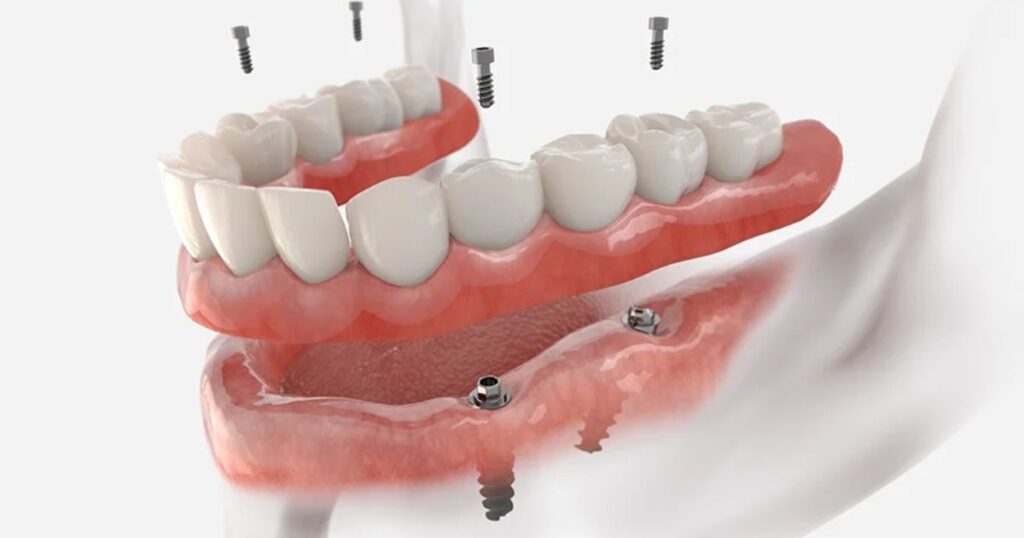
Maintaining implant-supported dentures involves specific care routines to ensure their longevity and oral health:
Daily Cleaning
Daily cleaning of implant-supported dentures is crucial for oral health. Use a soft-bristle brush and non-abrasive toothpaste to gently clean the dentures and surrounding gum areas. Floss around the implants with care, removing plaque and debris to prevent bacterial buildup.
Employ specialized cleaning tools like interdental brushes or water flossers for thorough cleaning. Consistent daily cleaning routines preserve the dentures’ integrity and maintain healthy gums, ensuring long-term oral hygiene and implant success.
Specialized Cleaning Tools
Specialized cleaning tools are essential for maintaining implant-supported dentures. Interdental brushes, water flossers, and oral irrigators effectively clean areas around implants that regular brushes might miss. These tools reach between teeth and around the implants, removing plaque and debris.
Their gentle yet thorough cleaning action helps prevent gum irritation and ensures proper hygiene, contributing to the longevity and health of both the implants and the surrounding oral tissues.
Non-Abrasive Products
Non-abrasive products are essential for maintaining implant-supported dentures. Using gentle toothpaste and mouthwash prevents damage to the denture materials and minimizes irritation to the gums. Abrasive products can wear down the surface of the dentures and implants, potentially leading to discomfort or compromised longevity.
Opting for non-abrasive options ensures effective cleaning without causing harm, preserving the integrity and lifespan of the prosthetics and supporting oral health.
Regular Dental Visits
Regular dental visits are crucial for maintaining implant-supported dentures. These routine check-ups, typically every six months, allow dentists to assess the implants’ health, monitor any changes, and professionally clean hard-to-reach areas around the prosthetics.
These visits enable early detection of potential issues, ensuring timely intervention and preventing complications. Dentists also provide personalized advice, ensuring proper care to prolong the lifespan of the implants and maintain overall oral health.
Avoid Damaging Habits
To safeguard implant-supported dentures, avoiding damaging habits is crucial. Refrain from chewing hard items like ice or pens, which can strain or fracture the dentures. Additionally, resist using teeth as tools to open packages or bottles, preventing potential damage to both the dentures and implants. These habits can compromise the stability and longevity of the prosthetics, necessitating repairs or replacements, impacting oral health and functionality.
Quit Smoking
Quitting smoking significantly benefits the success and longevity of implant-supported dentures. Smoking compromises oral health by hindering proper healing after implant surgery, increasing the risk of implant failure. It restricts blood flow, delaying the healing process and weakening the jawbone.
Smoking also elevates the chances of gum disease, which can compromise the stability of implants. Quitting smoking not only enhances overall oral health but also improves the success rate and longevity of dental implants.
Follow Professional Advice
Adhering to professional advice is crucial for maintaining optimal oral health with implant-supported dentures. Dentists provide personalized care instructions, including cleaning techniques, follow-up schedules, and lifestyle adjustments. Compliance with these recommendations ensures proper healing, longevity of implants, and prevention of complications.
Regular check-ups allow dentists to assess the implants’ condition and address any concerns early, ultimately contributing to the success and durability of the implant-supported dentures.
By following these guidelines and maintaining good oral hygiene practices, individuals can preserve the integrity of their implant-supported dentures and ensure a healthy, functional smile for years to come.
Who Is a Candidate for Implant Dentures?
Implant dentures offer a transformative solution for many, yet candidacy depends on individual oral health and bone structure. Generally, individuals with good oral hygiene, sufficient jawbone density to support implants, and healthy gums are strong candidates.
However, those with underlying health conditions impacting bone healing, heavy smokers, or individuals undergoing certain medical treatments may require further evaluation. A comprehensive assessment by a dental professional determines suitability, ensuring that implant dentures align with each individual’s specific needs and health circumstances.
Comparing Implant Dentures to Other Tooth Replacement Options
Sure, creating a chart about different tooth replacement options like implant dentures involves comparing various factors like durability, cost, maintenance, and functionality. Here’s an example:
| Comparison Factors | Implant Dentures | Bridges | Removable Dentures |
| Durability | High | Moderate | Low |
| Cost | High | Moderate | Low |
| Maintenance | Low | Moderate | High |
| Functionality | Excellent | Good | Fair |
| Bone Health | Preserves | Minimal | Can cause deterioration |
| Comfort | High | Good | Fair |
This chart compares different tooth replacement options based on key factors. Implant dentures generally score high in durability, functionality, and bone health but come with a higher cost. Each option has its own set of advantages and considerations.
FAQ’s
How long do implant dentures last?
Implants have the ability to last a lifetime with proper care and maintenance though your denture will likely need to be replaced every 10 to 15 years due to regular wear and tear on the porcelain. The nylon O-rings will wear out more quickly and probably need to be replaced every one to five years.
Which is best denture or implant?
Are Dental Implants Better Than Dentures? While dentures are more affordable than dental implants, they don’t solve the problem of jawbone deterioration.
What are the 3 types of dental implants?
The three most common types of dental implants are endosteal, subperiosteal, and zygomatic. Endosteal is the most common and safe method. Subperiosteal comes next, and zygomatic is the most complicated.
Conclusion
Implant dentures stand as a transformative solution in modern dentistry, redefining the landscape of tooth replacement with their unparalleled stability, natural feel, and functionality. These prosthetics, firmly anchored to the jawbone through dental implants, offer a level of confidence and comfort unmatched by traditional dentures.
Beyond aesthetics, they promote jawbone health, preventing deterioration and preserving facial structure. The ability to restore nearly natural biting and chewing functions allows individuals to enjoy a diverse range of foods without concern. While the initial investment may be higher, their longevity and minimal maintenance compared to traditional options make them a cost-effective and durable choice in the long run.
Embracing implant dentures means embracing not just a new set of teeth but a renewed quality of life, improved oral health, and the freedom to smile, eat, speak, and even upgrade from an upper partial denture with confidence and ease.
